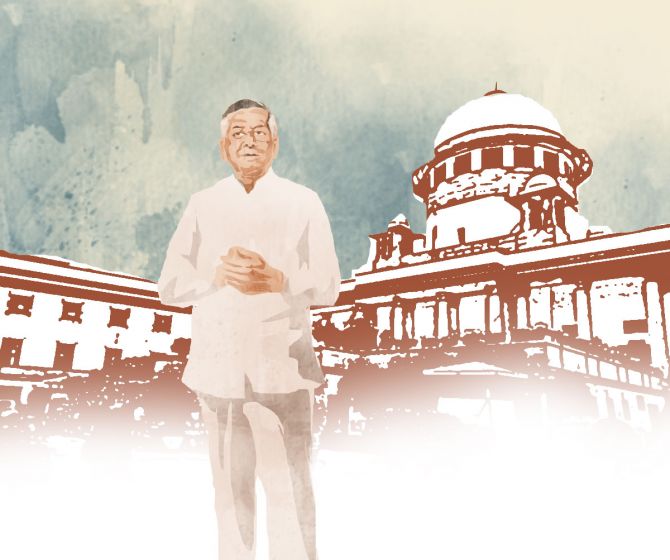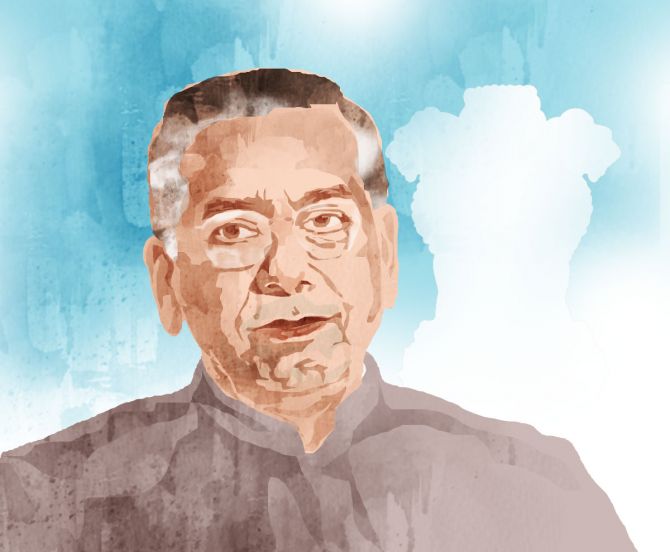With his appointment as AG, the many Constitutional law matters that are pending before the Supreme Court will receive specialised attention.

The chambers of the late P P Rao, legendary lawyer and brilliant legal draftsman, have yielded many talented counsel.
R Venkataramani, 72, who was named Attorney General of India, began his career as a lawyer as P P Rao's junior.
With his appointment as AG, the many Constitutional law matters that are pending before the Supreme Court will receive specialised attention.
Venkataramani's forte is Constitutional law. He was a student of the late Professor Madhava Menon at the Government Law College, Puducherry, and started his practice in 1977.
He joined P P Rao's chambers in 1979. Many recall Justice Jeevan Reddy's contribution in his elevation as Senior Advocate in the Supreme Court in 1997.
Many also see him as a victim of regional politics in the Bar.
'Venkataramani has a deep knowledge and interest about the Constitution and human rights. I met him in the 1990s when he came to Puducherry during our protest against a lock-up death on behalf of the Federation of People's Rights,' tweeted D Ravikumar, the Villupuram MP.
'In the late 1990s, he was about to be selected as a Supreme Court judge but due to protests from the Delhi bar, he lost that opportunity,' Ravikumar stated.
"This is reinforced by former Madras high court judge Justice K Chandru who recalled in a signed newspaper article that 'it was R Venkataramani (a senior advocate in the Supreme Court) upon whose name being recommended (for judgeship), there was protest by a section of the Delhi Bar in the late 1990s.'
However, Venkataramani has not let any of this vitiate his career progression or interests.
His doggedness and devotion to the law over four decades has led him through both the court and academia.
He has served twice as a member of the Law Commission (2010 and 2013).
He has written many books including Judgements by O Chinnappa Reddy - A Humanist; The Supreme Court Practice & Procedure and a volume on the Law of Torts.
It has been a career of steadiness and competence, said one of his peers, though occasionally he has taken a diversion.
One such was his acceptance to being co-opted in 2008 to write a report that would lead to statutory status to the Equal Opportunity Commission to be set up by the ministry of minority affairs.
Of course, little was heard of the report or the Bill as the United Progressive Alliance found other priorities in its two terms and successive National Democratic Alliance governments have said there's no need for one, given Prime Minister Narendra Modi's slogan of Sabka Saath, Sabka Vikas, Sabka Vishwas.
At that time, Venkataramani found himself in the company of someone the present government would find adversarial: Kalpana Kannabiran, for one, who was also roped in along with him and many other critics of the present regime.
Appreciation at his appointment has come from another unlikely quarter: People for Animals, the group of animal welfare activists founded by Maneka Gandhi.
"We are fortunate that the outgoing as well as the newly appointed AG have stood up for animal welfare pro bono. We hope the office of the AG will continue to uphold Constitutional duties of Indians towards animals," said Gauri Maulekhi, a PfA trustee.
She recalled how PfA approached Venkataramani in 2016 to appear for it against jallikattu, the bull-taming sport especially prevalent in Tamil Nadu and Maharashtra that animal welfare groups oppose vehemently for the cruelty it involves.
At that time, Venkataramani opposed a central government notification allowing jallikattu.
"He was very good on Constitutional grounds and he spoke with a lot of compassion for animals. He appeared pro bono for the matter. And time and again, we have sought his opinion on other matters in the Supreme Court and he's always been extremely obliging," Maulekhi said.

Now, of course, the boot is on the other foot.
The state governments made their own laws (animal welfare is a concurrent subject) and the Supreme Court has said the Prevention of Cruelty to Animals (Tamil Nadu Amendment) Act, 2017, needs to be decided by a larger bench since it involved substantial questions relating to interpretation of the Constitution.
As AG, Venkataramani will have to defend the central government's stance -- diametrically opposite to his convictions.
"He will do what is Constitutionally right," said Maulekhi.
On the other hand, Venkataramani has fought some recent cases where he has been on the same side at the government.
He appeared on behalf of a teacher in Karnataka who is questioning the Karnataka high court's refusal to ban the hijab.
His argument in court was that teachers must have a free atmosphere to communicate with students without a wall of separation.
The court asked: 'Hijab is a wall of separation?'
Mukul Rohatgi was first offered the job and he turned it down.
But before that, he ensured the law ministry issued a memorandum by which the AG secured the right to first accept or reject the cases he elected to argue. Senior lawyers say this is not unusual.
"Every AG has his own style. There have been hands-on AGs such as Soli Sorabjee and Goolam Vahanvati. But there have been others who have decided it is not necessary argue every matter. In the Kesavanand Bharati case, for instance, though Niren De was Attorney General, the brunt was borne by Mr (H M) Seervai who was appearing for the state of Kerala," said a senior lawyer of the Supreme Court.
Well-known Constitutional and civil rights lawyer Sanjay Hegde says if P P Rao were alive today, he would be delighted at Venkataramani's appointment.
He recalled his conversation with Rao just before his death in 2017. K K Venugopal had just been appointed AG.
"The TV was playing the news. He [Rao] said: 'I'm so glad the sun has shone at last for Mr Venugopal.' Then he added softly: 'For some people the sun will set without having risen'."
Hegde said: "He was, of course, talking about himself. But if he were here today, he would be so proud."
Feature Presentation: Aslam Hunani/Rediff.com












 © 2025
© 2025